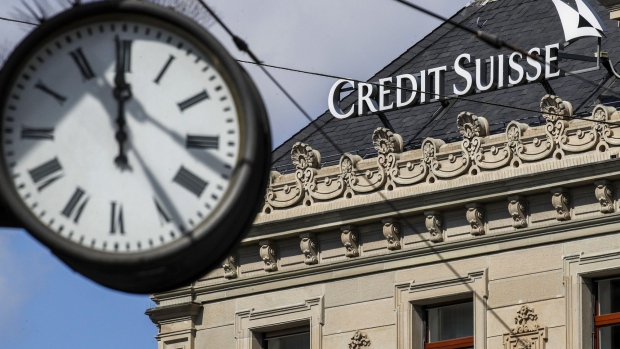Dec 7, 2021
Credit Suisse Execs Quizzed as Rogue-Banker Case Quickens
, Bloomberg News

(Bloomberg) --
Six past and current Credit Suisse Group AG executives face questioning as a stalled probe into the bank’s potential criminal liability for a massive fraud orchestrated by one of its former star performers gathers pace.
Two of the six executives already met with the Geneva prosecutor last month, according to people familiar with the matter. None of the six have been suspected or accused of any wrongdoing.
A third is to be questioned later this month, while the others will provide testimony or other information in meetings set to resume in February, said the people who did not want to be identified as the matter is private.
Nearly four years after Patrice Lescaudron was convicted of fraud and forgery, the direction of the latest probe into what if any criminal responsibility the Zurich-based bank holds could face charges over is beginning to take shape.
The direction of the latest probe into what if any criminal charges the Zurich-based bank could face is beginning to take shape. The investigation into the bank was split from Lescaudron’s in 2017 to fast-track his case.
But his former clients, including the principal victim Georgian billionaire and ex-prime minister Bidzina Ivanishvili have voiced frustration with the lack of headway in the investigation into the bank since Lescaudron was convicted in 2018.
All investigations into the affair conducted by the bank, financial watchdog Finma and the criminal authorities since 2015 have shown that Lescaudron “was not supported by any other employee of the Credit Suisse in his criminal activities,” the bank said in a statement. “On the contrary, the relationship manager received monetary rewards from the plaintiff for years without the plaintiff informing Credit Suisse.”
Though two recent attempts the clients made to have the Geneva prosecutor, Yves Bertossa, recused from the case were rebuffed by a Swiss court, the same tribunal also noted the lack of progress. The probe has seen “no significant development,” and acts of investigation have been “rare and most often executed” following requests from plaintiffs or because of higher court injunctions, the tribunal said.
Lescaudron, who took his own life in 2020, was a lone wolf who hid his crimes from colleagues and superiors, Zurich-based Credit Suisse has consistently said.
A spokesman for the Geneva Prosecutor’s Office said he can’t comment with the investigation still in progress.
Lescaudron’s clients, who made their fortunes in post-Soviet Russia, have never accepted that version of events, and say his faked trades and forged contracts can’t, or at least, shouldn’t have gone undetected. For failing to stop him, they say, the bank bears criminal responsibility.
Lawyers for Ivanishvili last month filed another criminal complaint against the bank, reiterating allegations of systemic money laundering as a result of Lescaudron’s crimes. Lescaudron himself was convicted of fraud, forgery and criminal mismanagement but not of money laundering.
“This could only take place because of the disorganization of the bank and the culpable blindness of its employees,” Ivanishvili’s lawyers said.
They say they’re unsure the bank has learnt any lessons from the Lescaudron affair or other recent scandals, despite claiming to have mended its ways.
A spying scandal led to the departure of the Credit Suisse CEO early last year, and then the twin collapse in March of Greensill Capital and the Archegos family office prompted an exodus of staff, a management overhaul and a decision to exit its prime brokerage business to focus on wealth management.
“For years and until today, they have managed all legal issues with the same methods: they procrastinate and stonewall, even when the evidence clearly speaks against the bank,” said Ollivier and Giroud.
(Updates with lawyers’ comment in last paragraph)
©2021 Bloomberg L.P.